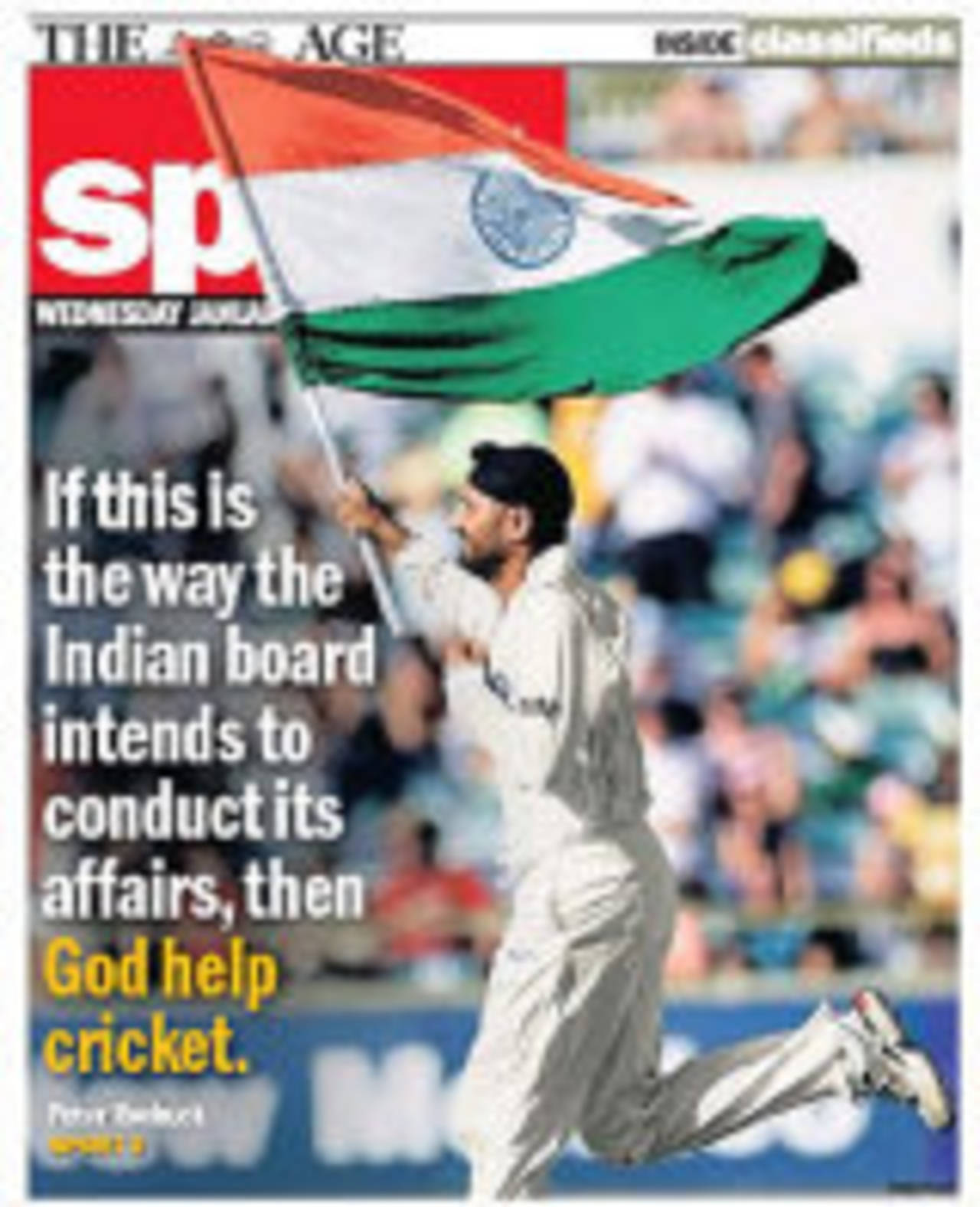Tired of being little brother
Sriram Veera
25-Feb-2013

The Age
On the topic of India's over-the-top reactions to the events in Australia, Harsha Bhogle, in the Sydney Morning Herald, explains that it has a lot to do with the change in attitude of the average Indian over the decades.
Since I was a little child, my abiding memory is of visiting journalists and cricketers coming to India and making fun of us.We were a country finding our feet, we were not confident, we seethed within but we accepted. The new generation in India is not as accepting, they are prouder, more confident, more successful. Those bottled-up feelings are bubbling through.
The Daily Telegraph reveals that Ricky Ponting made the decision to agree to have Harbhajan Singh's racial abuse charge downgraded after a series of secret meetings with lawyers during the Test match in Adelaide.
"Just fix it then," Ponting is understood to have said when emotions flared. As Symonds came to terms with the judgment, it's believed he said: "I can't believe this is happening."
The Australian has acquired the full text of Justice John Hansen's decision in Harbhajan Singh's appeal.
Australian newspapers are full of reaction to the outcome of the Harbhajan Singh affair, in The Age it is reported that the Australian cricketers are furious that Harbhajan Singh has escaped suspension.
"The thing that pisses us off is that it shows how much power India has," said a contracted Australian player, who refused to be named. "The Aussie guys aren't going to make it (the accusation) up. The players are frustrated because this shows how much influence India has, because of the wealth they generate. Money talks.
In the Sydney Morning Herald, Alex Brown says, "in matters directly involving the Indians, don't expect an impartial outcome. Both the BCCI and the ICC have shown their hand in that regard during the past month."
In the Australian Peter Lalor writes, "India, the team that bleated about the spirit of cricket after being beaten in Sydney, has again held a gun to the game's head and had its demands met."
Adelaide Now's Geoff Roach tracks the day's events.
An air of anxiety began to stir among them as the start of play drew nigh without any sign of the principal players. That soon turned to frustration when it was learned the Australian participants had performed their own version of an Indian rope trick by driving into an underground car park and entering the building via a basement lift.
Fearing the same would happen with the Indian party, most camera operators surged 80m east to the car park entrance – only to have to sprint frantically back as a black BMW disgorged Harbhajan and team manager Chetan Chauhan outside the front at 10.50am.
The Australian sports radio stations too are abuzz with listeners calling in to air their opinions. Click here to listen to a few stations.
It’s not just inside Australia comment that the result of the Harbhajan hearing has attracted comment. In The Times, Christopher Martin-Jenkins is less than complimentary about the BCCI’s role.
One understands, of course, the particular sensitivity of matters pertaining to race, but either the BCCI, like all other national representative bodies, accepts the rules of the ICC and, in this case, the procedures that everyone has agreed, whatever the outcome, or there is potential anarchy.
It would not be a good thing if it were to become the expected outcome of every appeal that, whenever a nation's pride is ruffled, oil will be poured on troubled waters. Every case has to be judged on its merits.
Also in The Times Patrick Kidd writes that both teams should move on.
1) If they felt that he had done nothing wrong, India were right to fight this to clear his name. They should now refrain from gloating or complaining about being picked on and get on with the cricket.
2) If Australia thought they had heard a racial slur, they were right to complain. They should now accept that they were mistaken, not complain about the verdict and get on with the cricket.
Prem Panicker, writing in rediff.com, wonders whether in the light of the judgement ICC would take any action on Mike Procter.
Is it fair to say that Procter brought the game into disrepute by delivering a contentious verdict where there was—according to the ICC’s own man—no evidence to underpin such a judgment? And if that is a fair assessment of the performance of the match referee, is it fair to ask what, if anything, the ICC does, what processes it has, to monitor its own officials, to pull them up, to ensure optimum performance?
Sriram Veera is a former staff writer at ESPNcricinfo